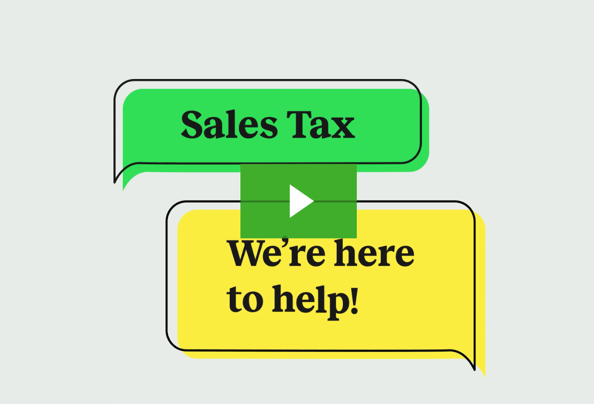California State Sales Tax 2021: What You Need to Know
by November 1, 2020
California is the most populous state in the US, and one that is notorious for aggressively pursuing eCommerce sellers for sales tax, even now that they’ve passed an economic nexus law. For that reason, it always pays to keep an eye on what the Golden State is up to when it comes to new sales tax rules, laws and programs.
Here’s what eCommerce sellers need to know about California sales tax as we dive into 2021.
The Basics of California State Sales Tax
California sales tax rate: The statewide California sales tax rate is 7.25%. This rate is made up of 6.00% state sales tax rate and an additional 1.25% local rate. You can read a breakdown of California’s statewide tax rate here.
California local sales tax rates: These vary by district. Find the most up-to-date California sales tax rates here.
How to collect sales tax in California: California is a modified-origin state, which makes figuring out just how much you are supposed to collect in sales tax a little confusing. Long story short, California requires that you collect from buyers the California state sales tax rate of 7.25% plus a district rate. You can find out a whole lot more about collecting sales tax in California here.
Got Nexus in California?
If you are an online seller and have sales tax nexus in a state, then you are required to collect sales tax from buyers in that state. Here’s what creates nexus in California (via the California tax code).
Economic nexus: California’s “economic nexus law” went into effect on April 26, 2019. With the passage of this law, online businesses who make more than $500,000 in gross revenue in the state in the previous or current calendar year are required to collect sales tax when selling to California buyers, regardless of where they are located. Read more about California’s economic nexus law here.
Marketplace facilitator sales tax: Starting Oct 1, 2019, marketplaces are required to collect California sales tax on behalf of third party sellers. This means that sellers who sell via marketplace are no longer considered the seller of record and are no longer required to collect California sales tax. However, be cautious before cancelling your California sales tax permit. You can read what eCommerce businesses need to know about California sales tax here.
If you have nexus in California, ensure that you are signed up to collect sales tax. Click here for how to register for a California sales tax permit.
What’s New in California Sales Tax for 2021?
COVID-19 Relief
California was one of the first states to provide COVID-19 relief to taxpayers, and the state continues to allow taxpayers extra time to file and pay.
As the pandemic has rolled on, the state has also gotten their act together when it comes to granting extensions. While previously taxpayers were required to request an extension, as of December 2, 2020 taxpayers filing returns of less than $1 million are automatically given a three month sales tax filing extension on returns due between December 1, 2020, and April 30, 2021.
Further, small businesses with annual taxable sales of $5 million or less can now also apply for a 12-month, interest-free payment plan to defer payment of up to $50,000 for 4th quarter 2020 and the 1st quarter of 2021 in sales and use tax liability. Rather than paying all sales tax up front, the business could break payment up into twelve individual installments.
Learn more about California’s latest COVID relief in this update.
California Continues to Pursue eCommerce Sellers for Back Sales and Income Tax
However, where California gives with one hand, it takes with the other. California persists in the trend pursuing remote (out-of-state) online sellers for what they see as taxes rightfully belonging in their coffers. The most recent effort, though, was not from the usual suspect, the California Department of Tax and Fee Administration (CDTFA) which governs sales tax, but from the California Franchise Tax Board (CFTB) which governs state income tax.
Letters dated October 2020 found many Amazon sellers, asking them to report and pay past due California income tax due to the fact that they had inventory stored in the state. Sellers were left in the difficult position of either proving to the state of California that they didn’t owe tax, or paying a tax bill they had no idea they had incurred. And unfortunately, this letter referred to tax year 2018 so it seems likely that the state will perform a similar audit for tax year 2019. We recommend reading more about California’s latest tax move against eCommerce sellers here.
CDTFA Open by Appointment Only, Strives to be More Accessible Online
Also due to COVID, the CDTFA and other California state offices remain either temporarily closed or open by appointment only. You can find a list of California tax offices and their status here.
Though the offices might not be open in person, the CDTFA has made a commendable effort to be more accessible online. This includes a new Live Chat feature that can be found here.
More California Sales Tax Resources
- California Sales Tax Guide for Business (Updated!)
- California Department of Tax and Fee Administration
Looking for more information on how to navigate sales tax in California?
Download our free Guide to Sales Tax Returns in California.
Have questions or something to say about California sales tax? Start the conversation in the comments.
Ready to automate sales tax? To learn more about TaxJar and get started, visit TaxJar.com/how-it-works.








